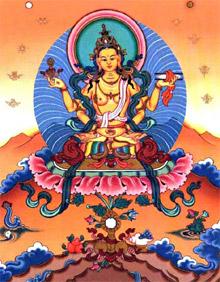
The ârya Avalokiteshvara, the bodhisattva, treading the path of the Perfection of Wisdom wich is profound and unfathomable, beheld only the five agregates, wich in themselves were empty of an independant self-existence.
Ô Sâriputra, form is emptiness and the very emptiness is form ; form is non-different (or non-separate) from emptiness and emptiness is non-different from form. That wich is form is emptinesss and that wich is emptines is form ; even so are feelings, perceptions, psychological impressions or tendencies and consciousness.
Here, ô Sâriputra, all dharmâ (phenomena or elements) are characterised by emptiness ; they are not given rise to nor are they restrained ; they are neither impure nor immaculate ; neither inadequate nor complete.
Thus, ô Sâriputra, in emptiness there is no form, no feeling, no perception, no mental, impressions or tendencies, no consciousness ; no yey, no ear, nose, tongue, body, mind ; no forme, sounds, smells, tastes, tactile sensations or psychological objects (thoughts and so on) ; nothing known as the element of sight and so on, up to the element of the mind. There is no ignorance and hence, no cessation of ignorance, and so on. There is neither birth and dead nor their cessation, no sorrow nor its arrising not its cessation nor a path to such cessation. There is no wisdom, attainment, or non-attainment.
Thus, because there is non attainment, the bodhisattva dwells solely in perfect wisdom, without the least veil of mental activity. Because of the absence of this veil, nothing makes him tremble (fear), he has transcended wathever is capable of disturbing him and he attains nirvâna in wich he remains firmly established. All the buddhâ in the three periods of time are established in the perfection of Wisdom and are therefore fully awake to the right and perfect enlightenment.
Therefore one should know the Prajñâpâramitâ mahâmantra wich is supreme knowledge, supreme mantra and wich remedies all suffering and sorrow in truth, for it is true. Here is the mantra declared in Prajñâpâramitâ :
Tadyathâ Om Gate Gate Pâragate Pârasamgate Bodhi Svâhâ.
Source: Buddhaline




